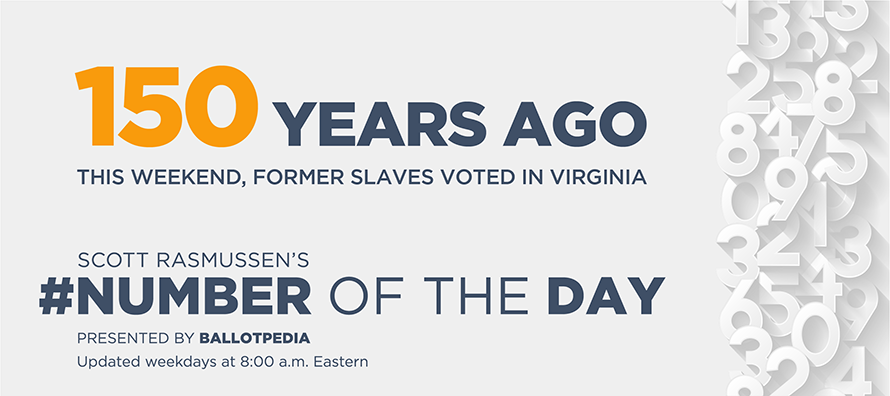Scott Rasmussen's Number of the Day for October 20, 2017
The Number of the Day columns published on Ballotpedia reflect the views of the author.
October 20, 2017: Following the Civil War, defeated Confederate States were required to draft and ratify new state constitutions. As part of that process, “the army's commanding general in Virginia ordered that African Americans be given the right to vote for and to be elected delegates to the convention.”[1]
One hundred and fifty years ago this weekend—on October 22, 1867—93,145 African Americans who had been enslaved and freed went to the polls and cast their ballots. Not only that, 24 were elected as delegates to the state’s Constitutional Convention.[1]
The resistance to allowing black Virginians to vote was intense (as was true throughout the former Confederate States). It required a military presence by the Union Army to enforce this basic right. Less than a decade after blacks first voted in Virginia, however, the Union military presence ended. The right of blacks to vote was taken away and not restored until the civil rights movement of the 1960s.
The decisive moment was the 1876 presidential election. When the votes were tallied, 13 Electoral College votes in three Southern states were disputed. Without those votes, Democrat Samuel Tilden had a 12-vote lead. That meant Republican Rutherford B. Hayes could become president only by winning all 13 of the disputed Electoral College votes.
Had blacks been able to participate freely, there’s no doubt Hayes would have carried the states and all the Electoral College votes. African-American voters were reliably Republican in those days. However, as described in Politics Has Failed: America Will Not, the fraud and voter suppression in Southern states was beyond anything we can imagine in the 21st century.
The election wasn’t finally decided for months. When all was said and done, Hayes became president and the Union troops left the South. There are many hints of a corrupt bargain to make this happen. Black voters were not only denied the vote for decades to come, but many black leaders who had been elected to office became victims of violence. At least seven were killed.[2]
Special thanks to Rosanna Bencoach, the general registrar of voters in Charlottesville, Virginia, for suggesting this Number of the Day.
Each weekday, Scott Rasmussen’s Number of the Day explores interesting and newsworthy topics at the intersection of culture, politics, and technology.
- October 19, 2017 – 17 percent of federal workers are under 35 years old
- October 18, 2017 – $131 billion in corporate tax expenditures
- October 17, 2017 – 40 percent of cloud computing market controlled by Amazon
- October 16, 2017 – 15 state legislative chambers could see change in partisan control
- October 13, 2017 – 51 percent of Americans say government should not favor any set of values
- To see other recent numbers, check out the archive.
Scott Rasmussen’s Number of the Day is published by Ballotpedia weekdays at 8:00 a.m. Eastern. Click here to check out the latest update.
The Number of the Day is broadcast on local stations across the country. An archive of these broadcasts can be found here.
Columns published on Ballotpedia reflect the views of the author.
Ballotpedia is the nonprofit, nonpartisan Encyclopedia of American Politics.
See also
Footnotes
| |||||||||||||||||||||||



